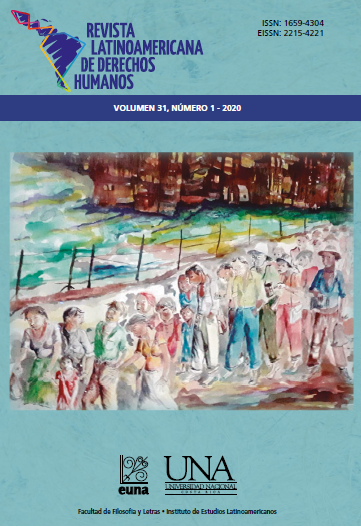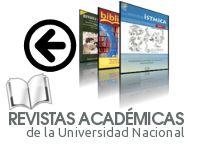How I migrated from Venezuela to Costa Rica: certainties and uncertainties. Testimony as a necessary tool to problematize the Costa Rican institutionality in terms of migratory processe
DOI:
https://doi.org/10.15359/rldh.31-1.1Keywords:
Mobilizations, Human rights, Testimony, IntegrationAbstract
The sustained increase in mobilizations from Venezuela to Costa Rica appears as a highly complex phenomenon, the revision of which has quickly exhausted the traditional categories of analysis. This is why, from a human rights perspective, this article is based on the story and experience of the migrant as a necessary tool to highlight the shortcomings and limitations of the Costa Rican institutional framework that embraces individuals mobilized from Venezuela. Access to human rights, for example, guarantee to due process and information, and even the right to migrate (or not to be forced to do so) is questioned from the experience narrated by Andreina, who migrated to Costa Rica seeking to improve her quality of life and whose experience is vital to deconstruct the discourse that has been perpetuated by the institutions that regulate the access of migrants and by the State as guarantor of human rights. Both the geopolitical analysis of the Venezuelan context, as well as the analysis of her story, manage to materialize the structural and cultural violence that are reproduced by the institutional framework and public policies designed to contain the growing human mobilization throughout Latin America.
References
Acedo, N. (2017). El género testimonio en Latinoamérica: aproximaciones críticas en busca de su definición, genealogía y taxonomía. Latinoamérica. Revista de Estudios Latinoamericanos, (64), 39-69. https://doi.org/10.22201/cialc.24486914e.2017.64.56863
Acosta, D., Blouin, C., & Feline, L. (2019). La emigración venezolana: respuestas latinoamericanas [Ebook] (2nd ed., p. Research gate). Lima: Fundación Carolina. Recuperado de https://www.researchgate.net/publication/331773383_La_emigracion_venezolana_respuestas_latnoamericanas
Calderón, L. (2017). Tú eres recordar: la historia oral y el estudio del proceso migratorio contemporáneo. En De Garay, G. y Aceves, J. (coords.), Entrevistar ¿Para qué? Múltiples escuchas desde diversos cuadrantes. México: Instituto Mora. Pp. 271-297. Recuperado de: https://www.redalyc.org/pdf/652/65247751003.pdf
Cartín, A. (25 de julio de 2017). Migrantes tienen menor acceso a ayudas sociales y servicios de salud. Semanario Universidad.
Castillo, T., Reguant, M. (2017). Percepciones sobre la migración venezolana: causas, España como destino, expectativas de retorno. Migraciones, 41. https://doi.org/10.14422/mig.i41.y2017.006
Estévez, A. (2016). ¿Derechos humanos o ciudadanía universal? Aproximación al debate de derechos en la migración. Revista Mexicana de Sociología, 78(1). Pp. 61-87. Recuperado de: http://www.scielo.org.mx/pdf/rms/v78n1/0188-2503-rms-78-01-00061.pdf
Gatica, G. (2018). Aportes de las personas migrantes y refugiadas en la creación de riqueza en Costa Rica. Rev. Rupturas, 71-100. https://doi.org/10.22458/rr.v8i1.1974
Lander (2017) en Chávez, D., Ouviña, H., & Thwaites, M. (2017). Venezuela, lecturas urgentes desde el sur (1st ed.). Buenos Aires: CLACSO. https://doi.org/10.2307/j.ctvtxw3dn
León, L. E. (2010). La migración en la quinta república: redimensión del clivaje partidista y nuevos desarraigos, un fenómeno reciente de movilización social en Venezuela 1999-2009. Clío América, 4(7). Pp. 58-69. Localizable en: http://revistas.unimagdalena.edu.co/index.php/clioamerica/article/view/396
Mateo, C. & Ledezma, T. (2006). Los venezolanos como emigrantes. Estudio exploratorio en España. Revista Venezolana de Análisis de Coyuntura, 12(2). Recuperado de: https://www.redalyc.org/articulo.oa?id=364/36412214
Ministerio de Salud, F. L. (2003). Migración y Salud en Costa Rica: elementos para su análisis. San José, Costa Rica.
Ng, R. (2008). Integración local de la población refugiada en Costa Rica. Revista IIDH, 46, 231--256.
Poder Legislativo (2019, septiembre 25). Migración. Recuperado del sitio web de Migración: https://www.migracion.go.cr/Documentos%20compartidos/Leyes/Ley%20General%20de%20Migraci%C3%B3n%20y%20Extranjer%C3%ADa%208764.pdf
Randall, M. (2002). ¿Qué es, y como se hace un testimonio? En. Beverly, J. y Achúgar, H. La voz del otro. 2 edic. Guatemala: Universidad Rafael Landivar. Pp. 33-58. https://doi.org/10.2307/4530621
Teruggi (2017) en Chávez, D., Ouviña, H., & Thwaites, M. (2017). Venezuela, lecturas urgentes desde el sur (1st ed.). Buenos Aires: CLACSO. https://doi.org/10.2307/j.ctvtxw3dn
Voorend, K. (22 de diciembre de 2017). El mito del imán de bienestar. La caja, los migrantes y la exclusión. Semanario Universidad.
Downloads
Published
How to Cite
Issue
Section
License
El material que se publica en esta Revista está bajo una licencia “Creative Commons” 3.0 Costa Rica (CC, Reconocimiento-NoComercial-SinObraDerivada 3.0 Costa Rica (CC BY-NC-ND 3.0 CR) . Esto significa que el material publicado en la revista se puede compartir (copiar y distribuir) en cualquier medio o formato considerando que se debe reconocer de forma adecuada la autoría del material y la fuente, no puede utilizarse con fines comerciales y no se aceptan las obras derivadas (remezclar, transformar o crear a partir del material).








